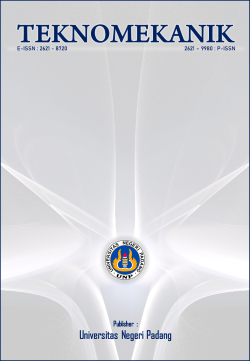Development of food and beverage service module at vocational high schools culinary service expertise program
DOI:
https://doi.org/10.24036/jptk.v4i1.19823Keywords:
Food and Beverage Service Module, Research and Development (R & D), Validity, Practicalities, EffectivenessAbstract
This article aims to explain that the study was to develop a learning module on the subjects of Food and Beverage Services for students majoring in food services at SMK Putra Anda Binjai. This study was Research and Development (R & D) using the ADDIE development model. The results of research and development done in this study indicate that the validation results by learning modules covering material expert’s feasibility content with value Aiken's V = 0.78 valid criteria, eligibility presentation of Aiken's V = 0.80 on valid criteria, aspects of language with Aiken's V = 0.8 on valid criteria, and validation of design experts with Aiken's V = 0.80 on valid criteria. Test practitioners learning modules to two teachers showed an average yield of 81.67 in the category of "very practical", while practitioners by 3 students showed an average yield of 79.32 category of Very Practical overall results of the validation by subject matter experts, expert media practitioners and the overall test states that learning modules rated valid and practical, so that used to test for effectiveness. The result of the effectiveness of the learning modules has an average pretest score is 50.83 while the average post-test value to 76.95 so it can be concluded that post-test value results are more significant. Therefore, from the validity of the test results, the practicalities and effectiveness, then learning modules on subjects worthy of Food and Beverage Service use as a source of student learning Vocational High School Programs Hospitality
Downloads
References
Gagne, R, M., & J., B. L. (1974). Principle of Instructional Design. Holt, Rinehart & Winston.
Hake, R. R. (1999). Analyzing Change/Gain Scores. Dept. of Physics, Indiana University 24245
Islami, S., Candra, O., Usmeldi, Sartiva, W., & Imelda, Z. (2021). Implementation of the tournament-type method of learning in basic electrical installation subjects. In Borderless Education as a Challenge in the 5.0 Society. Taylor & Francis Group.
Undang-undang sistem pendidikan nasional, (2003).
Pernanda, D., Zaus, M. A., Wulansari, R. E., & Islami, S. (2018). Effectiveness of instructional media based on interactive cd learning on basic network at vocational high school : improving student cognitive ability. International Conference on Education, Social Sciences and Technology, January, 440–444. https://doi.org/10.29210/2018163
Sadiman, A. (2012). Media pendidikan pengertian, pengembangan dan pengembanngan dan pemamfaatanya. Rajawali Press
Sudjana, N. (2011). Penilaian Hasil Proses Belajar Mengajar. PT. Remaja Rosdakarya
Yulastri, A., Hidayat, H., Ganefri, G., Edya, F., & Islami, S. (2018). Learning outcomes with the application of product based entrepreneurship module in vocational higher education. Jurnal Pendidikan Vokasi, 8(2), 120. https://doi.org/10.21831/jpv.v8i2.15310
Yulastri, A., Hidayat, H., Ganefri, Islami, S., & Edya, F. (2017). Developing an Entrepreneurship Module by Using Product-Based Learning Approach in Vocational Education. International Journal of Environmental & Science Education, 12(5), 1097– 1109.
Downloads
Published
How to Cite
Issue
Section
License
Copyright (c) 2021 Ajeng Inggit Anugrah

This work is licensed under a Creative Commons Attribution 4.0 International License.





